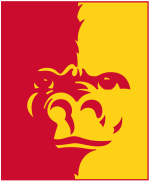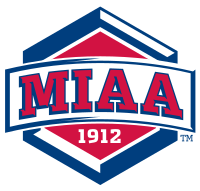Pittsburg State University
Pittsburg State University (Pitt State or PSU) is a public university in Pittsburg, Kansas, United States. It enrolls approximately 7,400 students (6,000 undergraduates and 1,400 graduate students) and is a member of the Kansas Board of Regents.
 | |
| Motto | By doing, learn. |
|---|---|
| Type | Public |
| Established | March 6, 1903[1] |
| Affiliation | Kansas Board of Regents |
Academic affiliation | ASAIHL |
| Endowment | $70.18 million (2017)[2] |
| President | Steven A. Scott |
| Provost | Lynette J. Olson |
Academic staff | 301[3] |
| Students | 6,645 (Fall 2019)[4] |
| Location | , , United States 37°23′29″N 94°42′09″W |
| Campus | Rural, 223 acres (0.90 km2) |
| Colors | Crimson and Gold[5] |
| Nickname | Gorillas |
Sporting affiliations | NCAA Division II – MIAA |
| Mascot | Gus the Gorilla |
| Website | pittstate.edu |
  | |
History
Pittsburg State University was founded in 1903 as the Auxiliary Manual Training Normal School, originally a branch of the State Normal School of Emporia (now Emporia State University). In 1913, it became a full-fledged four-year institution as Kansas State Teachers College of Pittsburg, or Pittsburg State for short. Over the next four decades, its mission was broadened beyond teacher training. To reflect this, in 1959 its name was changed again to Kansas State College of Pittsburg. It became Pittsburg State University on April 21, 1977.[6]
Presidents
Pittsburg State has had 11 leaders. The top leadership post was originally titled as Principal from 1903 to 1913. In 1913, the title was changed to President.[7]
- Russell S. Russ (1903–1911)
- George E. Myers (1911–1913)
- William A. Brandenburg (1913–1940)
- O. P. Dellinger (1940–1941)
- Rees H. Hughes (1941–1957)
- Leonard H. Axe (1957–1965)
- George F. Budd (1965–1977)
- James Appleberry (1977–1983)
- Donald W. Wilson (1983–1995)
- John R. Darling (1995–1999)
- Tom W. Bryant (1999–2009)
- Steven A. Scott (2009–present)
Campus
Located in southeast Kansas, the 223-acre (0.90 km2) campus[8] is also the home of the $30 million Kansas Technology Center, a state-of-the-art technology program in the largest academic building in Kansas.[9]
In December 2014, the university opened the Bicknell Family Center for the Arts. The Bicknell Center provides Pittsburg State University with its first true performance facility since 1978, when deterioration forced the closure of Carney Hall. In addition to the Linda & Lee Scott Performance Hall, the facility also houses a 250-seat theater, a 2,000-square-foot art gallery, grand lobby, reception hall, and multi-use rehearsal space for large musical groups.
PSU also operates a satellite campus in the Kansas City metro area, the Kansas City Metro Center Campus,[10] offering a variety of bachelor's and master's degrees.[11] Two degrees are offered in Salina, Kansas on the campus of Salina Area Technical College.[11]
Student Life
Greek organizations
Recognized fraternities and sororities at this university include:
| Interfraternity Council | Panhellenic Council | Multicultural Greek Council |
|---|---|---|
| Lambda Chi Alpha fraternity | Alpha Gamma Delta sorority | Alpha Phi Alpha fraternity |
| Phi Sigma Kappa fraternity | Alpha Sigma Alpha sorority | Lambda Pi Upsilon sorority |
| Pi Kappa Alpha fraternity | Sigma Sigma Sigma sorority | |
| Sigma Chi fraternity | ||
| Sigma Phi Epsilon fraternity | ||
| Sigma Tau Gamma fraternity |
Academics
PSU is organized into the following schools and colleges:
- College of Arts and Science
- Kelce College of Business
- College of Education
- College of Technology
The Kelce College of Business is accredited by the American Assembly of Collegiate Schools of Business (AACSB). In addition, research institutes are located on campus such as the Business & Technology Institute and the Kansas Polymer Research Center,[12] housed in the newly completed Tyler Research Center.
Ranking
According to U.S. News & World Report, Pitt State is tied for #101 among Regional Universities Midwest (#26 among Public Schools).[13]
Admissions
In order to be accepted into PSU, one must score 21 or higher on the ACT, be in the top one third of one's class, complete the pre-college curriculum with at least a 2.0 GPA on a 4.0 scale (out-of-state residents must have at least a 2.5 GPA on a 4.0 scale), or have 24 or more transferable college credit hours with at least a 2.0/4.0 cumulative grade point average.
The average grade point average and ACT score for an admitted freshman was 3.30 and 21, respectively, according to The Princeton Review. According to the College Board, 91% of applicants are accepted into Pittsburg State University.
Athletics

The school competes in the NCAA Division II and has been a member of the Mid-America Intercollegiate Athletics Association (MIAA) since 1989. The University currently fields teams in 10 sports, including:
|
Men's sports
|
Women's sports
|
Club Sports
- Men’s Club Baseball
Football
The Pitt State football program began in 1908 under head coach Albert McLeland. Since that time, the program has produced the most wins in NCAA Division II history. It has been national champions on four occasions; 1957,1961,1991 and 2011. Pittsburg State defeated Wayne State University, MI, 35–21 to claim its most recent national championship in 2011. During the 2004 season the Gorillas finished 14–1, losing 31–36 to Valdosta State University in the NCAA Division II National Football Championship. Pittsburg State has won, outright or shared, a total of 27 conference championships during the 96-year history of its intercollegiate program, including 13 conference titles in the last 19 seasons under Coach Chuck Broyles PSU reached the Division II National Championship game in 2004, 1995, and 1992. Its games with fellow MIAA Division II powerhouse Northwest Missouri State University are played at Arrowhead Stadium in Kansas City, Missouri, in the Fall Classic at Arrowhead. 26,695 attended the 2002 game—the most of any Division II game.[14]
The Gorillas
PSU is the only university in the United States to feature a gorilla as a mascot. The concept of the mascot was conceived in 1920, and officially adopted on January 15, 1925.[15] Current mascot, Gus, was designed in 1985 by L. Michael Hailey.[16]
Apple Day
Back in 1907, a small delegation from the Pittsburg area lobbied the state legislature to give the newly established university an appropriation that would pay for the construction of the school's first building. But one of the delegate members, Pittsburg mayor Clarence Price, apparently broke the rules by not exiting the floor before the session began (in some versions of the story, it was the namesake of Russ Hall, R. S. Russ, who performed the gaffe). The legislators good-naturedly fined the Pittsburg delegation a barrel of apples before awarding them the appropriation. And when the men returned to Pittsburg, the students were so amused by the story that they decided university administrators and faculty who had missed work and class in order to lobby in Topeka should have to pay the same fine. In those days, students were penalized for truancy. Because members of the faculty left their classrooms in order to attend the legislative session in Topeka, the students reasoned that faculty members should be penalized for their absence.[17]
Twelve months later, on March 6, 1908, classes were dismissed for the entire day in honor of the first Apple Day (officially titled Commemoration Day). During an afternoon program in the assembly room of the Central School building, the students once again fined the faculty a barrel of apples. Thus began the unique, annual, tradition at Pittsburg State of the teachers bringing apples for their students.[17]
Notable people
- Fira Basuki, Indonesian novelist[18][19]
- John Brown, wide receiver for the Buffalo Bills
- Gary Busey, film actor (attended, did not graduate)
- Terry Calloway, former Republican member of the Kansas House of Representatives
- Eldon Danenhauer, Offensive tackle for the Denver Broncos
- Ralph Earhart, former NFL halfback, Green Bay Packers
- Dennis Franchione, former head football coach of Texas A&M University (and former coach of Pittsburg State)
- Eugene Maxwell Frank, Bishop of the United Methodist Church
- Kendall Gammon, former NFL longsnapper, Kansas City Chiefs and current Chiefs radio analyst (currently employed by Pittsburg State)
- Don Gutteridge, Major League Baseball player and manager (Chicago White Sox)
- Jay W. Hood, Major General U.S. Army, Commander 1st U.S. Army East, Ft. Meade, Maryland, former commanding general JTF Guantánamo Bay, Cuba
- David P. Hurford, psychologist and researcher in dyslexia and attention deficit hyperactivity disorder
- John E. Jacobs, Interim president of Emporia State in 1953; Director of Special Education for the Kansas State Department of Education from 1953–1957
- Jennifer Knapp, Grammy-nominated Christian music artist; sold over 1 million albums
- Inez Y. Kaiser, the first African-American woman to run a public relations company with national clients[20]
- Sherm Lollar, Major League Baseball player
- Aaron McConnell, American football player
- Ronald Moore, former NFL running back (Arizona Cardinals), 1992 Harlon Hill Trophy winner
- Brian Moorman, NFL punter, Buffalo Bills
- Jim Press, Chrysler ,vice chairman and president
- H. Lee Scott, former Wal-Mart president and CEO
- Steven A. Scott, ninth president of Pittsburg State University
- Michael Shonrock, former president of Emporia State University
- Sally Stonecipher, first female United States Army helicopter pilot
- James Tate, writer who won the 1992 Pulitzer Prize for poetry
- Duane Thiessen, lieutenant general, United States Marine Corps
- Lucinda Todd, civil rights activist and plaintiff, Brown vs. Board of Education of Topeka
- Jackie Vietti, President of Butler Community College for 17 years; served as interim president of Emporia State University in 2015
- Steve Weddle, American novelist
- Pat Woodrum, Executive director of Oklahoma Centennial Botanical Garden; former executive director of the Tulsa City-County Library System
- Darryl Wren, former NFL defensive back
- Douglas Youvan, biophysicist
References
- "A Brief History of Pittsburg State University" (PDF). Retrieved September 10, 2016.
- As of June 30, 2017. "U.S. and Canadian Institutions Listed by Fiscal Year (FY) 2017 Endowment Market Value and Change in Endowment Market Value from FY2016 to FY2017" (PDF). Archived from the original (PDF) on March 6, 2018. Retrieved January 30, 2018.
- "College Portrait of Pittsburg State in 2007" (PDF). Archived from the original (English) on May 24, 2010. Retrieved February 15, 2010.
- "BOARD OF REGENTS ANNOUNCES 2019 FALL SEMESTER ENROLLMENT" (PDF). October 2, 2019. Retrieved November 21, 2019.
- Pittsburg State University Brand Identity Standards Manual (PDF). Retrieved May 24, 2016.
- History page from 2009–11 catalog
- "Previous PSU Presidents". Pittsburg State University. Archived from the original on January 5, 2014.
- "Campus Map". Pittsburg State University.
- "Pittsburg State University, Kansas". usjournal.com. Archived from the original on March 20, 2008. Retrieved April 7, 2008.
- http://kcmetro.pittstate.edu
- "Off-Campus Programs". Graduate and Continuing Studies. Pittsburg State University. Retrieved December 31, 2014.
- "Kansas Polymer Research Center, Pittsburg Kansas – Pittsburg State University". kansaspolymer.com.
- "Top Public Schools Regional Universities Midwest, US News & World Report".
- "The Fall Classic at Arrowhead III". cstv.com.
- "Iconic mascot began as a way to build 'pep' on campus". Pittsburg State University.
- "Pittsburg State Gorillas". Pittsburg State University.
- "Apple Day - Pittsburg State University". Pittstate.edu. February 21, 1903. Retrieved September 10, 2016.
- "[ACAD] Book – Jendela-Jendela". ohiou.edu.
- Fira Basuki (January 1, 2006). The Windows. Grasindo. p. 178. ISBN 978-979-759-452-7.
- Schmitt, Will (August 4, 2016). "Inez Y. Kaiser, first black woman to own a national PR firm, dies at 98". The Kansas City Star. Retrieved August 10, 2016.
External links
| Wikimedia Commons has media related to Pittsburg State University. |
